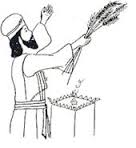Keeping the Day of Firstfruits
The Day of Firstfruits is a little known or publicized feast in our Faith Community. Firstfruits is also referred to as Yom haBikkurim (Hebrew) and the Wave Sheaf Offering. It is sandwiched into the week of Passover–Unleavened Bread and always occurs on the first-day of the week after the weekly Sabbath during the Passover–Unleavened Bread week.

We were instructed to bring an omer of barley–the firstfruits of our spring harvest–to the Levitical Priests who would wave it before YHVH on the Day of Firstfruits.
This Gregorian Calendar year, Firstfruits took place on the first day of the week—4-8-18 according to the Observational Calendar and on the first-day of the week on 4-1-18 according to the Jewish Calculated Calendar. On the Jewish Calendar, it is noted as Pesach II and the 1st Day of the Omer.
The instructions Father gave regarding the keeping of Firstfruits is found in Leviticus 23:10-14. As with each of the Torah-instructed Feasts of YHVH, Firstfruits is rich in prophetic and spiritual application.
How Do We Keep Sabbath Holy–Is it Permissible to Have our Children Play Organized Sports on the Sabbath?
Is it permissible to have our children play organized sports on the Sabbath? Would this be a violation of Torah and of Sabbath-Keeping?
This situation and many, many others are not addressed in Torah. We must be careful not to add to or take away from Torah.
The applications related to this question goes well beyond simply allowing our children to play organized sports on the Sabbath. Torah’s silence on this and many other aspects and issues of Sabbath-keeping require us to examine:
–Our relationship with the Almighty
–What it means to keep the Sabbath Holy
–What it means to proclaim a holy convocation on the Sabbath
–What it means to do no work on the Sabbath
Why did Father make Sabbath-keeping so vague in the first place? It was likely to test our hearts and commitment to Him. It also serves as a gauge to measure the level of relationship we have with Father.
The silence of Torah on the keeping of Sabbath (as well as a great many other issues and topics) resulted in the Rabbi’s creating hundreds of rules and traditions around the keeping of Sabbath that include 39-general categories of what is required to keep Sabbath (http://www.pursuegod.org/rules-pharisees/). These 39-general categories in turn include hundreds of specific individual rules for Sabbath-keeping. These rulings and instructions are contained in the Talmud.
When addressing the concerns of the Samaritan woman at Jacob’s well regarding where YHVH had established the place of worship, He was noted as saying:
“You Samaritans worship what you do not know. We worship what we do know, because salvation is from the Jews (i.e., from the lineage of Judah and the oracles entrusted to Judah by Father as opposed to the religion of Judaism). (Continuing) But an hour is coming, and is now here, when the true worshipers will worship the Father in spirit and truth. Yes, the Father wants such people to worship Him. Yah is Spirit and those who worship Him must worship in spirit and truth” (John 4:22-24; Holmann CSB).
Thus Master foretold of a two-prong formula for worship of Yah that would be practiced under the renewed covenant: Spirit and Truth.
As it relates to Truth, our worship is founded upon Torah and the teachings of Yeshua Messiah:
Psalm 119:160—”Thy Word is true from the beginning: and every one of thy righteous judgments endureth forever” (KJV).
In terms of Spirit, our worship is founded upon having a substantive–personal–relationship with YHVH:
“And this is eternal life, that they (they being Master’s disciples which ultimately includes us)—that they know you the only true God, and Yeshua Messiah whom you have sent” (John 17:3; ESV; adjusted).
“To know” here is the Greek term “ginosko,” which means to “learn to know a person through direct personal experience, implying continuity of relationship” (Louw-Nida Lexicon). This “knowing” that Master was referring to is more than a simple cognitive awareness that God exists.
The relationship we have with Father, when coupled with His Torah—His Truth–through the agency of the Holy Spirit (i.e., the Ruach HaKodesh)–help us navigate through such questions of Sabbath-keeping.
Once we establish a true and substantive relationship with the Creator, we get to know what He approves of and what He does not approve of, even in the areas where Torah is silent.

Recent Comments